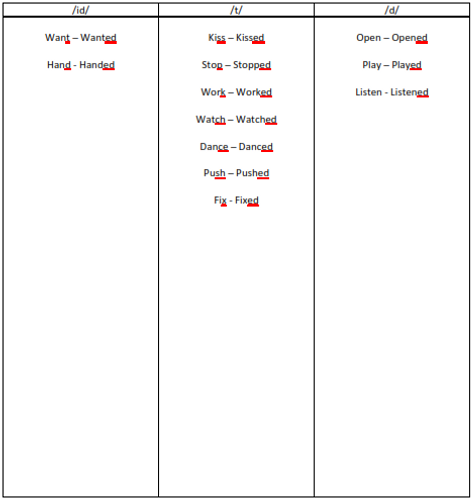




This week we will look at Relationships and Stories. We will see how to tell a story. We will also look at the Past Simple and the Past Continuous. We will also examine Adverbs of Manner, the verb "get" and "ed" and "ing" Adjectives.

Look at the picture on the left. Do you agree with the statement?
What do you think love is?
Match the idioms with their meanings in the attached document
Now complete the conversation in this document
Simple Past & Irregular Verbs
One of the most difficult parts of the Simple Past is the irregular verbs. You can find out more about the Simple Past on the Grammar Page, you can also see a list of the Irregular Verbs in the document attached. Before you look at these, see how many irregular verbs you know.
go _____________ write _______________ buy _____________
tell ____________ meet _______________ speak ____________
bring ___________ send ______________ take _____________
draw ___________ put _____________ drink _____________
eat ___________ know _____________ give ______________
Regular Verbs
Be careful with Regular Verbs, it is not always as easy as just adding "ed", there are some exceptions.
For Regular Verbs, you also need to be careful with pronunciation. See how many more verbs you can add to each group.

Past Continuous
The past continuous is formed from the past tense of be with the -ing form of the verb:
We use the past continuous to talk about the past:
-
for something which continued before and after another action:
The children were doing their homework when I got home.
-
for something that happened before and after a particular time:
It was eight o’clock. I was writing a letter.
-
to show that something continued for some time:
My head was aching.
Everyone was shouting.
-
for something that was happening again and again:
I was practising every day, three times a day.
-
with verbs which show change or growth:
The children were growing up quickly.
You can find more information on the Grammar Page.
Talk with your partner about what you did last weekend using the Simple Past and the Past Continuous.
Complete these sentences using the Simple Past and the Past Continuous.
1. Helen (do) her weekly shopping when she (meet) her old friend, June.
2. The sun (shine) when I (get) up this morning. I (feel) so tired!
3. Jim (wait) at one airport while Max (wait) at the other. What a disaster!
4. It (rain) very hard, so the referee (decide) not to play the match.
5. When the police (arrive) at the party, the music (play) very loud and everybody (shout).
6. The mail (arrive) very late today. It (come) after eleven o'clock.
7. Joan (become) very angry this morning. She (speak) to an important client and someone (enter) the room without knocking.
8. Hank (cook) in the kitchen. His sister (offer) to help but Hank (refuse).
Adverbs of Manner
Adverbs of manner tell us how something happens. They are usually placed either after the main verb or after the object.
-
He swims well.
-
He ran quickly.
-
She spoke softly.
-
James coughed loudly to attract her attention.
-
He plays the flute beautifully. (after the direct object)
-
He ate greedily the chocolate cake. [incorrect]
-
He ate the chocolate cake greedily. [correct]
You can find more information on the Grammar Page.
Now try the excercises in the attached document.
What is the difference between "bored" and "boring"? Talk with a partner and discuss the difference.
You can find information on "ed" and "ing" adjectives in the attached document and by following the link.
Write a story, using all the grammar points we have looked at in this Unit, ending with the sentence "I will never forget that night for the rest of my life".







